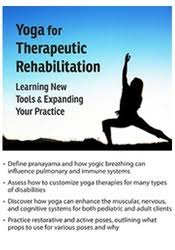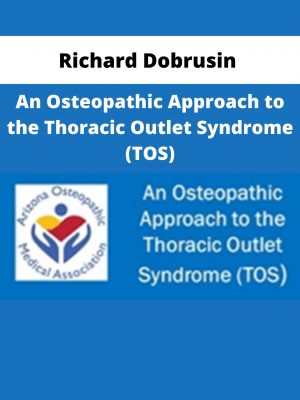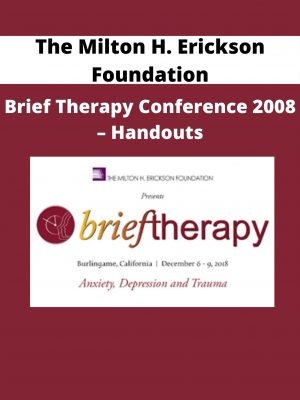Betsy Shandalov – Yoga for Therapeutic Rehabilitation, Learning New Tools & Expanding Your Practice
$200 Original price was: $200.$75Current price is: $75.
Shopping Instructions:
- DISCOUNT 15% : SHOP15
- Product Delivery: Within 1 – 12 hours after purchase.
Yoga has become increasingly popular in the western mainstream world these days, but its therapeutic applications are relatively unknown to most rehabilitation clinicians
Betsy Shandalov – Yoga for Therapeutic Rehabilitation, Learning New Tools & Expanding Your Practice
Yoga Applications across the Lifespan
Yoga has become increasingly popular in the western mainstream world these days, but its therapeutic applications are relatively unknown to most rehabilitation clinicians. This recording is specifically designed for therapists! You will expand your therapeutic repertoire and improve client functions through incorporating yoga in nearly any setting. This material is highly useful for both adult and pediatric clients, and it can be used to assist with pain management too. In fact, yoga therapy can be used with the clients therapists struggle most to help!
Yoga for Therapeutic Rehabilitation will tap into your knowledge of anatomy and physiology (not to mention a little psychology) in order to enhance treatment plans for clients with issues ranging from multiple sclerosis and cancer to cerebral palsy, spinal cord injury, and many orthopedic and neurological disorders. You will discover innovative ways to use props and equipment to assist your clients’ therapeutic outcomes. You will view group breakout sessions in which you will discover ways to maximize function using yoga postures for clients in a wide array of settings. By incorporating yoga into your therapeutic practice, you will begin to see health care in a whole new, expanded way. Do not miss this exciting opportunity to bring yoga as a treatment modality to your clients.
This recording is designed for people of all skill levels. You do not need to be experienced with yoga to be able to watch this recording or integrate its benefits with clients!
- Discover how yoga can enhance the muscular, nervous, and cognitive systems for both pediatric and adult clients.
- Practice restorative and active poses, outlining what props to use for various poses and why.
- Describe how yogic breathing can influence pulmonary and immune systems.
- Convey how yoga therapy is able to alleviate pain.
- Cite ways that yoga can provide therapeutic benefits to improve muscular and joint stability.
- Explain the difference between active and restorative poses and list the therapeutic benefits of each.
- Correctly determine how to position a client with a disability using restorative poses.
- Identify how positioning and pranayama can improve your clients’ overall wellness.
- Demonstrate how to use basic yoga poses, sequences, and deep relaxation using props for modification depending on client’s diagnosis.
- Create customized client treatment plans that incorporate yoga.
Why Yoga as a Therapeutic Modality?
- What is yoga?
- Understand Integrative Medicine
- Review body systems and how they work together
- Understand types of yoga and how yoga therapy aids body systems
- Neuroplasticity of the brain and eye, and brain exercises for adults and kids
- The Nervous System and pain control
- How yoga comforts pain clients
Anatomy of Therapeutic Yoga: Cardiopulmonary System
- Review pulmonary anatomy (case study)
- Proper breathing and its benefits
- Types of pranayama
- Breathing exercises
- Therapeutic breathing and your adults and kids
- When to use pranayama for adults and kids
- Define breathing and positioning
- upright
- side-lying in bed
- wheelchair
- standing
- Case study with group practice of pranayama, seated and standing pose demo
Anatomy of Therapeutic Yoga: Musculoskeletal System
- Posture and nerve and muscle communication
- Anatomy of the shoulder and hip joints
- Opening the joint door: muscle and body balance
- Practical applications for diagnoses
- Secondary disabilities and their consequences, dissecting the mechanics of movement
- spasticity
- hypotonicity
- muscle imbalance
- Yoga as medicine for adults and kids from dependent clients to active clients
Would you like to receive Betsy Shandalov – Yoga for Therapeutic Rehabilitation, Learning New Tools & Expanding Your Practice ?
Asana Application and Treatment
- Asana poses
- The science of restorative vs. active poses and the body’s response
- Decide between restorative vs. active poses for treatment
- Case studies in a variety of settings from hospitals to schools
- Perform active poses
Poses: Props and Our Patients
- Perform restorative poses
- How do resting poses help clients with disabilities? (client with cancer case study)
- The importance of elongation and extension of the body and how props assist your clients
- Pictures of supported and active yoga poses for clients with a variety of disabilities
- Props for therapeutic use with spasticity, abnormal tone, weakness, or imbalance
- How do you decide if your client needs resting or active poses and how much?
- Is the client prone, supine, or in a wheelchair?
Pose Lab and Case Study Presentations
- Practice poses and experience the therapeutic benefits of a restorative pose vs. an active pose
- Using props through visuals and poses
- Examine 5 different case studies and determine what poses are best for your clients
- Therapeutic benefits of each pose for each diagnosis and their contraindications
- What props to use for each pose and why
Yoga and Expanding Client Treatment
- In your setting: acute care, inpatient, outpatient, home health, and hospice
- Throughout the lifespan
- Giving the client a gift in the community
- Recent studies in medicine and yoga
- Yoga and its future in health care
- Yoga and the Integrative Medicine team
Related products
HEALTH & MEDICAL
Matthew Troester – How Much Sleep Do We Need and How to Get It
HEALTH & MEDICAL
HEALTH & MEDICAL
HEALTH & MEDICAL
HEALTH & MEDICAL
HEALTH & MEDICAL












